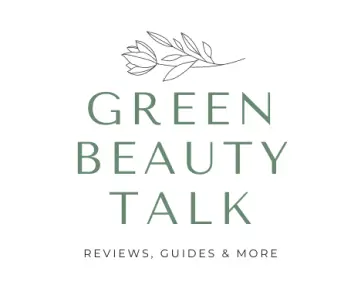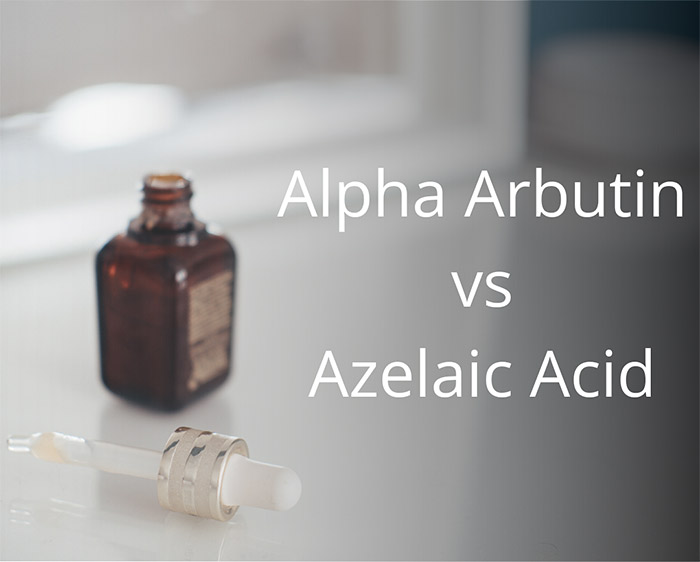
Discovering a new dark spot is always a let-down, and believe me, I’ve been there. In the vast world of skincare, Alpha Arbutin and Azelaic Acid stand out for their skin-lightening properties. But how do we pick between them? This guide will walk you through their key differences, benefits, and any side effects to watch out for. Together, let’s find out which ingredient might be the secret to achieving a brighter, more even complexion on your skincare journey.
Table of Contents
- What is Alpha Arbutin?
- What is Azelaic Acid?
- Side Effects of Alpha Arbutin and Azelaic Acid
- Spotting the Differences: Alpha Arbutin vs Azelaic Acid
- Can You Use Alpha Arbutin and Azelaic Acid Together?
- How to Use Alpha Arbutin and Azelaic Acid
- Alpha Arbutin Vs Azelaic Acid: Which is better for pigmentation?
- Which is Better for Acne?
- What About Eczema?
- Which One to Use if You Have Rosacea?
- Conclusion
What is Alpha Arbutin?
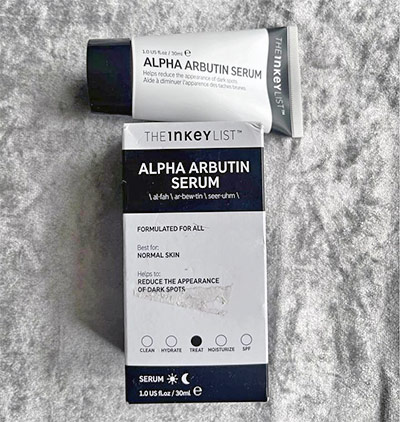
Alpha arbutin, a naturally occurring compound found in plants like bearberries, cranberries, and blueberries, has become a go-to ingredient in the skincare world, particularly celebrated for its ability to address dark spots and hyperpigmentation. Not to be mistaken for its relative, beta-arbutin, which is less stable, alpha arbutin is also available in a synthetic variant known as deoxy-arbutin.
Alpha arbutin operates as a tyrosinase inhibitor, meaning it disrupts the production of melanin and prevents dark spots from forming. Imagine melanin production as an assembly line where tyrosine and tyrosinase come together to create melanin. Alpha arbutin cleverly intervenes, substituting itself for tyrosine and halting the production line in its tracks.
It’s a favourite in skincare due to its gentle nature, making it suitable for various skin types, including sensitive skin, offering a kinder alternative to other skin-lightening ingredients. So, if you’re on a quest for an even, bright complexion, alpha arbutin stands out as a straightforward and effective option.
Benefits of Alpha Arbutin
Alpha arbutin is renowned for its ability to tackle hyperpigmentation while being gentle on the skin. Here are its key benefits:
- Effective Treatment for Pigmentation: It actively reduces visible dark spots, sunburns, and melasma, providing a clearer complexion.
- Skin Lightening: Alpha arbutin lightens the skin effectively, similar to hydroquinone, but without causing irritation, making it a gentle alternative.
- Evens Out Skin Tone: It helps to achieve a more uniform skin tone by reducing dark spots and other pigmentary issues.
- Suitable for All Skin Types: It is safe and effective for all skin types, ensuring everyone can benefit from its use.
- Compatible with Other Ingredients: Alpha arbutin can be used in combination with other skin-brightening ingredients, such as retinoids and exfoliating acids, without adverse effects.
- Prevents Future Pigmentation: It not only addresses existing dark spots but also inhibits melanin production to prevent future hyperpigmentation.
What is Azelaic Acid?
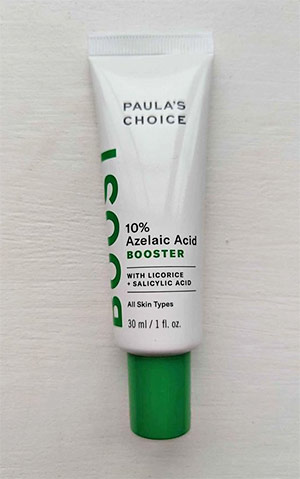
Azelaic acid is a dicarboxylic acid that naturally occurs in grains such as wheat, barley, and rye. It’s recognized in the skincare realm for its ability to manage various skin concerns, particularly hyperpigmentation and acne.
Available both in its natural form and as a synthetic variant, azelaic acid operates by inhibiting tyrosinase, an enzyme crucial for melanin production. Notably, it focuses its action on over-pigmented areas of the skin, leaving normal skin, freckles, and age spots unaffected.
In skincare products, you’ll find azelaic acid in various forms and concentrations. Prescription-strength options can contain up to 20% azelaic acid, while over-the-counter products typically feature it in lower concentrations, around 5-10%. It’s FDA approved to treat acne and rosacea, showcasing its recognized efficacy in managing skin conditions.
While not always the first ingredient highlighted in skincare, azelaic acid is favoured by dermatologists for its gentle yet versatile approach, addressing concerns beyond acne, such as redness, rosacea, and hyperpigmentation.
Benefits of Azelaic Acid
Azelaic acid brings several skincare benefits to the table:
- Anti-Inflammatory Properties: It soothes and reduces skin irritations and inflammations, providing relief especially for conditions like rosacea.
- Antibacterial Capabilities: The acid actively reduces bacteria on the skin, helping to manage and prevent acne outbreaks.
- Hyperpigmentation Treatment: It works effectively to fade various forms of hyperpigmentation, such as melasma and sunburns, and is diligent in fading acne scars.
- Mild Exfoliating Properties: Azelaic acid gently removes dead skin cells from the surface, revealing a brighter and smoother skin underneath.
- Skin Brightening: It acts as a non-irritating skin brightener, providing results comparable to hydroquinone, while being safe for all skin types.
- Anti-Aging: The acid helps minimize the appearance of wrinkles and fine lines, contributing to a smoother and more youthful appearance.
- Improved Skin Texture: It aids in breaking down dead skin that can lead to clogged pores and acne, enhancing your skin’s overall texture and tone.
- Redness Reduction: It minimizes redness, swelling, and bumps associated with various skin conditions, providing visual improvement for affected skin.
- Preventative Acne Care: Azelaic acid works to prevent new acne from forming by killing acne-causing bacteria, unclogging pores, and reducing potential inflammation.
Side Effects of Alpha Arbutin and Azelaic Acid
Although both of these products are commonly presented as two effective and safer alternatives to hydroquinone in treating hyperpigmentation, they have a few side effects that should be noted.
Side Effects of Alpha Arbutin
- Paradoxical Hyperpigmentation: In certain high concentrations, alpha arbutin may cause paradoxical hyperpigmentation, meaning it can unexpectedly darken the skin. This research highlights that while 3% alpha-arbutin can cause depigmentation, higher dosages might trigger hyperpigmentation.
- Hypersensitivity: Some individuals may experience hypersensitivity to alpha arbutin, which can manifest as irritation, mild skin breakouts, sun sensitivity, or redness.
Side Effects of Azelaic Acid
- Sun Sensitivity: Due to its mild exfoliating properties, azelaic acid can slightly increase the skin’s sensitivity to the sun. Always ensure to apply sunscreen after using products containing azelaic acid during the day.
- Skin Irritations: Though rare, azelaic acid may cause hypersensitivity in some individuals, resulting in skin dryness, mild irritations, and redness.
Spotting the Differences: Alpha Arbutin vs Azelaic Acid
We’ve explored the nitty-gritty of alpha arbutin and azelaic acid, so let’s break down the main differences between these two skincare gems:
- Addressing Skin Concerns: Alpha arbutin excels at fading dark spots and evening out skin tone, while azelaic acid is a jack of all trades, addressing acne, rosacea, and pigmentation.
- Suitability for Skin Types: Alpha arbutin is gentle and suitable for all skin types, particularly sensitive ones, whereas azelaic acid, while versatile, is particularly beneficial for oily and acne-prone skin.
- How They Work: Alpha arbutin works by inhibiting tyrosinase, an enzyme crucial for melanin production, while azelaic acid reduces keratin production, fights acne-causing bacteria, and also inhibits melanin production.
- Available in Products: Alpha arbutin is commonly found in serums and lightening creams, while azelaic acid is available in various formulations, including gels and creams.
- Possible Side Effects: Alpha arbutin is generally well-tolerated but may cause sun sensitivity and occasional irritation, while azelaic acid can lead to skin dryness and mild irritation in some individuals.
Can You Use Alpha Arbutin and Azelaic Acid Together?
It is totally safe to use alpha-arbutin and azelaic acid in the same routine. To date, there is no scientific evidence that indicates a negative reaction between alpha-arbutin and other skincare ingredients. In fact, many skincare products include both alpha arbutin and azelaic acid because they work really well together.
Benefits of Using Alpha Arbutin and Azelaic Acid Together:
- Dual-Action Approach to Hyperpigmentation:
- Together, they offer a comprehensive strategy, inhibiting melanin synthesis in varied ways and addressing hyperpigmentation more effectively.
- Enhanced Skin Brightening:
- The combination amplifies skin-brightening effects, working synergistically to lighten dark spots and enhance overall skin luminosity.
- Even Skin Tone and Texture:
- They work in tandem to even out skin tone and smooth texture, providing a unified, radiant complexion.
- Reduced Appearance of Acne Scars:
- Both ingredients contribute to diminishing the visibility of acne scars and other forms of hyperpigmentation.
- Effective Management of Various Skin Concerns:
- The duo addresses a range of skin issues, from reducing redness and managing different skin conditions like rosacea to tackling hyperpigmentation.
- Safe for All Skin Types:
- Both ingredients are known for their gentle nature, making the combination safe and suitable for all skin types, including sensitive skin.
Just keep in mind that azelaic acid does not pair well with certain ingredients like salicylic acid (BHAs) and alpha-arbutin is heat sensitive.
How to Use Alpha Arbutin and Azelaic Acid
When it comes to using alpha-arbutin and azelaic acid, here’s a simplified guide to get the most out of these potent ingredients.
Prepare Your Skin
Kickstart your skincare regimen by cleansing and toning your skin. Begin with a gentle cleanser to eliminate any impurities and follow up with a toner to balance your skin’s pH, ensuring it’s primed and ready to absorb the forthcoming active ingredients effectively.
Apply Alpha-Arbutin and Azelaic Acid
Introduce alpha-arbutin into your routine, applying the serum after your toner. Allow it to sink into the skin for a minute or two before proceeding. Next, layer on your azelaic acid product, ensuring the alpha-arbutin serum has fully absorbed to maximize efficacy.
Seal and Protect
Follow up with a moisturizer to lock in the active ingredients and hydrate your skin. If your routine is during the day, it’s crucial to finish with a broad-spectrum SPF to protect your skin, especially as these ingredients can make it more sun-sensitive.
Frequency of Use
Both alpha-arbutin and azelaic acid can generally be used twice daily. However, if you notice any irritation or if your skin is particularly sensitive, you may opt to use them in your evening routine to ensure no immediate sun exposure.
Should You Apply Alpha Arbutin or Azelaic Acid First?
The general rule of thumb in skincare is to apply products from the thinnest to the thickest consistency. If your alpha-arbutin product is a lighter serum and your azelaic acid product is a denser cream or gel, apply alpha-arbutin first. Conversely, if your azelaic acid product is lighter, it should be applied before alpha-arbutin.
Additional Tips for a Brightening Skincare Routine
While alpha-arbutin and azelaic acid are potent on their own, they can also be paired with other brightening ingredients like vitamin C or niacinamide for an enhanced skin-evening effect. Always remember to conduct a patch test when introducing new products to your routine to avoid any adverse reactions.
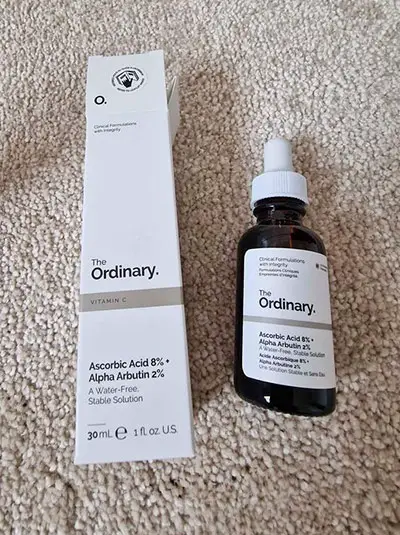
Alpha Arbutin Vs Azelaic Acid: Which is better for pigmentation?
Based on currently available studies, azelaic acid is presented as a better option to correct hyperpigmentation.
In a 2013 clinical study of different melasma treatments on 160 participants, a 20% azelaic acid cream was found to be more effective than a 5% arbutin + 0.5% Glabridrin cream as well as a 5% arbutin+ 10% glycolic acid +3% kojic acid cream.
When compared to hydroquinone, the most effective skin brightening agent in skincare, a 20% azelaic acid cream was found to be as effective as a 4% hydroquinone cream at treating melasma.
Alpha arbutin is widely recognized for its gentle yet effective dark spot lightening and skin tone evening capabilities. It’s a favoured ingredient for those specifically aiming to mitigate hyperpigmentation without resorting to potentially harsher ingredients.
Conversely, azelaic acid, while also acknowledged for its skin-lightening properties, is often hailed for its ability to combat acne and soothe skin, offering a dual-action approach to skincare.
Your choice between alpha arbutin and azelaic acid might ultimately depend on your specific skin concerns and desired outcomes. If hyperpigmentation is your primary concern, alpha arbutin might be your ideal pick. Conversely, if you’re dealing with a combination of acne and pigmentation, azelaic acid might offer a comprehensive, dual-benefit approach.
Which is Better for Acne?
While alpha-arbutin is only effective in fading acne scars, azelaic acid on the other hand helps prevent and treat acne. Its antibacterial properties are effective against Propionibacterium acnes, a bacteria responsible for causing inflammatory acne.
This is why azelaic acid is recommended in the treatment of mild (pustular/papular) to severe acne (cystic). Furthermore, its exfoliating properties enable it to prevent pores from getting clogged and in this way prevent acne.
What About Eczema?
Azelaic acid and alpha arbutin are generally considered non-irritants, however, for people with very sensitive skin, like eczema-prone skin, these active ingredients may not be suitable.
Although azelaic acid has anti-inflammatory properties, it may trigger irritations on eczema-prone skin.
Nevertheless, studies indicate that azelaic acid can be a possible treatment for certain forms of eczema such as perioral dermatitis. It is recommended to carry out a test patch before applying it to the rest of your skin.
A 2021 comprehensive review of the therapeutic potential of alpha-arbutin revealed that it is likely to cause contact dermatitis. As such may not be suitable for people with eczema-prone skin. It is recommended to check with a dermatologist before application.
Which One to Use if You Have Rosacea?
Rosacea is a predominantly inflammatory skin condition that requires to be managed using anti-inflammatory treatments. This is one reason why azelaic acid is a recognized treatment for rosacea.
Its anti-inflammatory properties give it a soothing effect that can help calm and reduce inflammations and breakouts caused by rosacea. In this study, a 15% Azelaic acid gel was more effective at treating rosacea than 0.75% Metronidazole gel.
On the other hand, alpha-arbutin is a skin brightener and has no anti-inflammatory properties, therefore it cannot help with rosacea.
Conclusion
In conclusion, both Alpha Arbutin and Azelaic Acid are valuable skincare ingredients, each with unique strengths. Alpha Arbutin is ideal for targeting hyperpigmentation and is suitable for all skin types, offering a gentler alternative for those sensitive to stronger agents.
Azelaic Acid, on the other hand, is versatile, effective against acne, rosacea, and pigmentation, making it a great choice for those with more complex skin concerns. Understanding your skin’s specific needs and how these ingredients work is key to integrating them effectively into your skincare routine. Remember, a balanced approach tailored to your individual skin type and concerns is always the best strategy for achieving optimal skin health and radiance.
Related content:
Can you use azelaic acid with hyaluronic acid?
Azelaic acid or benzoyl peroxide for inflammatory acne?
Can you use vitamin C and azelaic acid together?
Alpha Arbutin vs Vitamin C

Petra Nakashian (previously Kravos) is a dedicated natural health and beauty blogger, driven by the loss of her parents to cancer, which led her to meticulously research beauty product ingredients. With over 10 years of experience, her in-depth knowledge has made her a trusted expert in the field. Founder of Be Healthy Now and Green Beauty Talk, Petra recently expanded her expertise with Beauty Insights Hub, exploring a wider range of beauty treatments. Committed to transparency and honesty, her work is a vital resource for navigating the complex world of beauty.
